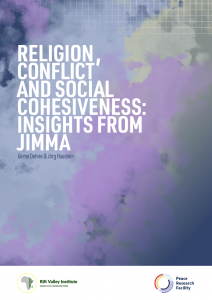SUMMARY
• Despite its predominantly Muslim surrounding area, Jimma is one of the most heterogeneous cities in Ethiopia’s Oromia region. Unlike other Ethiopian cities and towns, Jimma has not seen any major inter-religious or -ethnic clashes since the fall of the Ethiopian People’s Revolutionary Democratic Front. Even so, serious clashes between Muslims and Christians—both Orthodox and Protestant—did erupt in surrounding Jimma zone in 2006 (Beshasha) and 2011 (Asendabo).
• Today, the Beshasha and Asendabo clashes are still regarded as having upset the long-established status quo of inter-religious conviviality. The various alleged causes—competition over land, conspiratorial movements, political interests and rising extremism—are not seen as solved, prompting contemporary tensions to be interpreted through similar lenses. Thus, while the city and wider region have not seen any major inter-religious clashes since 2011, locals remain fearful that conflict could re-emerge.
• While such wariness has arguably led to successful preventative measures in some cases, Jimma has for the most part failed to develop comprehensive dialogue and peacebuilding structures. Despite some religious leaders engaging in inter-personal and communal activities, their initiatives appear hampered by a lack of ongoing support. Jimma’s Inter-Religious Council (IRC) largely seems to operate reactively, contributing to a perception that dialogue fulfils a primarily political function, leaving structural issues unaddressed.
• Nonetheless, a resilient ethos of inter-religious conviviality still appears to be present in
inter-personal relationships. Some issues of trust and scepticism towards inter-religious marriages notwithstanding, Jimma does not seem a religiously segregated space. Whether in family relations, friendships or workplace settings, the study unearthed numerous examples of mutual respect across religious boundaries. In particular, neighbourhood associations have kept people engaged, even where inter-religious relationships are otherwise absent.
• The IRC should be strengthened and financially supported in order to widen its reach and enable further preventative measures. Alongside this, stronger regulations need to be established granting more equitable access to land and public space. More generally, local government authorities must strive to observe the constitutional provisions ensuring secularism, the rule of law and impartial public service delivery.
Find the Amharic summary of this report here.




